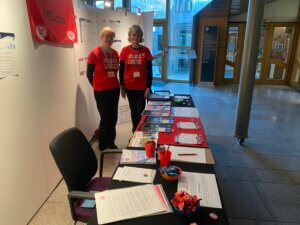Note: This is the final part of our series on education in ME/CFS. To start reading at the first article in this series, Top Medical Schools Teach Little About ME/CFS, click here.
Finding a physician with knowledge of ME can be challenging, but practitioners of three branches of alternative medicine may have learned about this disease in school. These branches are naturopathy, chiropractic medicine, and Traditional Chinese Medicine (TCM).
Naturopathy
 Naturopathic medicine de-emphasizes pharmaceuticals, taking a natural approach and emphasizing holistic, preventive care. Dr. Kimberly Sanders, naturopath and clinical Assistant Professor at the University of Bridgeport (UB) College of Naturopathic Medicine, said CFS is tested on the Naturopathic Physician Licensing Examination.
Naturopathic medicine de-emphasizes pharmaceuticals, taking a natural approach and emphasizing holistic, preventive care. Dr. Kimberly Sanders, naturopath and clinical Assistant Professor at the University of Bridgeport (UB) College of Naturopathic Medicine, said CFS is tested on the Naturopathic Physician Licensing Examination.
“Our profession as a whole recognizes the value in teaching our students how to diagnose and treat this condition,” Sanders said.
To diagnose ME, “Naturopathic students are trained to take a thorough history that often lasts 30 minutes or more,” she said. The physical exam evaluates symptoms ME patients present with while ruling out similar diseases. “Laboratory analysis is performed to rule out other conditions and also to look for viral influence, possible immune dysfunction, and endocrine abnormalities.”
Students treat ME patients during clinical training at UB’s Naturopathic Clinic. “Naturopathic students are taught to look for the underlying cause of CFS,” Sanders said. Depending on the patient’s history and lab values, treatment options include immunomodulating botanicals, nutritional supplements, and lifestyle management.
Chiropractic
 In teaching chiropractic medicine, the National University of Health Sciences School of Professional Studies emphasizes patient-centered, evidence-based, and integrative practice, said Dr. Ezra Cohen, Assistant Dean of Chiropractic Medicine and Chief Academic Officer of the Department of Clinical Sciences. He is a doctor of chiropractic medicine and certified massage therapist. He and other faculty members instruct students in ME diagnosis and treatment.
In teaching chiropractic medicine, the National University of Health Sciences School of Professional Studies emphasizes patient-centered, evidence-based, and integrative practice, said Dr. Ezra Cohen, Assistant Dean of Chiropractic Medicine and Chief Academic Officer of the Department of Clinical Sciences. He is a doctor of chiropractic medicine and certified massage therapist. He and other faculty members instruct students in ME diagnosis and treatment.
“What they’re introduced to is what the literature can support,” Cohen said, and gave information from the Centers for Disease Control and Prevention and National Institutes of Health as examples. As we have discussed previously at #MEAction, however, the CDC still recommends GET and CBT as the best treatments, despite the fact that time and time again, they have proved to be harmful, ineffective, or altered in some fundamental way in their use for ME patients that makes them yet more dangerous and/or ineffective. Moreover, both the follow-up to the PACE trial and a Belgian study found no long-term gains after CBT treatment, including no increased return to work. Until the CDC changes the recommendations on its website, many medical professionals will continue to be misinformed, and continue to teach this misinformation to others.
As for treatment, practitioners “can look to the whole person to see what their needs are,” he said. Students begin learning how to facilitate a patient’s narrative and develop relationships with patients in their first of 10 trimesters because clinical and classroom training are not separate.
ME patients’ individual needs determine which of the following interventions would be appropriate:
- lifestyle modifications
- sleep hygiene changes
- stress management
- pharmaceutical pain management
- nutrition changes
- supplementation
- light massage
- movement therapy
Cohen explained that pain management and supplementation in ME patients are done at the lowest dosage and least invasive levels, increasing only if necessary. He defined movement therapy as “all manner of motion that might improve the patient,” including tai chi and exercises a patient can do while sitting or in bed. Movement therapy starts at a low level and increases based on patients’ tolerance of physical exertion.
TCM
 Students of TCM — which includes acupuncture, Chinese herbs, and qigong — also learn about ME at the Oregon College of Oriental Medicine. Thebestschools.org ranks this institution as the best school for acupuncture in the United States. Dr. Michael Berletich, a doctor of acupuncture and Oriental medicine, licensed acupuncturist, and clinic supervisor and faculty member at OCOM, said he sees a “tremendous amount” of ME patients. About 30% of the clinic’s patients have ME or a similar chronic illness, he estimated.
Students of TCM — which includes acupuncture, Chinese herbs, and qigong — also learn about ME at the Oregon College of Oriental Medicine. Thebestschools.org ranks this institution as the best school for acupuncture in the United States. Dr. Michael Berletich, a doctor of acupuncture and Oriental medicine, licensed acupuncturist, and clinic supervisor and faculty member at OCOM, said he sees a “tremendous amount” of ME patients. About 30% of the clinic’s patients have ME or a similar chronic illness, he estimated.
However, students aren’t likely to diagnose ME specifically because TCM refers to illnesses in its own way, using terms such as damp or deficient to describe the flow of different types of energy among organ systems. This is not a denial or repudiation of modern diagnostic techniques, but a different lens through which to view the same illnesses. Berletich said diagnostic assessment begins as soon as the practitioner and patient are in the room together because students are trained to notice the appearance of the face, the patient’s smell, and what symbolic language he or she uses to describe symptoms. A TCM doctor also checks nine pulses on each arm at minimum.
“I can tell a lot from a pulse,” Berletich said, and added that each indicates which physiological structures are working well and which aren’t. Examining the tongue and palpating the abdomen also provide clues. Practitioners add those findings to a comprehensive intake to plan treatment. Treatment, in Berletich’s simplest terms, cleans out problems and strengthens inner energy.
Based on the information from these three schools, some alternative medicine practitioners have enough education to diagnose and treat ME patients. Allopathic medicine schools ought to follow suit and include this disease in their curricula and medical examinations.
#MEAction would like to thank Darla N. for her investigative reporting in this series! Read the stories in order by clicking on the links below:
1) Top Medical Schools Teach Little about ME/CFS
2) Medical Textbooks Earn a Failing Grade in ME/CFS – 1 of 2
3) Medical Textbooks Earn a Failing Grade in ME/CFS – 2 of 2
4) Three Schools of Alternative Medicine Teach about ME
Save
Save
Save
Save
Save
Save






5 thoughts on “Three Schools of Alternative Medicine Teach about ME”
Thank you for putting a naturopathic school first! I have been getting naturopathic care and am making good progress under the care of excellent NDs who have been associated with the top US naturopathic school, Bastyr University, which has campuses in California and Washington State.
Last I heard, Bastyr had a good reputation — I’m glad to hear that they’re still well-respected.
Learner, I pray your good progress continues! Bastyr was the first school I approached for an interview, but the scheduling didn’t work out. Thanks for reading!
It is good to know ND’S are learning about ME. As with allopathic practitioners, some ND’S are cognizant of ME as a serious, complex, neuroimmune disease, and some seem to think it is just fatigue easily solved with a few lifestyle changes and supplements. The latter group will hopefully be upgrading their knowledge by learning about the current biomedical discoveries for this very debilitating disease. It would also be good for them to include the Canadian Consensus Criteria, and the International Consensus Criteria in their curriculum.
Thank you for noticing that it’s difficult to get a practitioner with expertise in ME. We know that this can be diagnosed as fatigue easily and basing from http://learntruehealth.com can be cured with alternative medicine if not severe. Further research is still necessary.
Comments are closed.